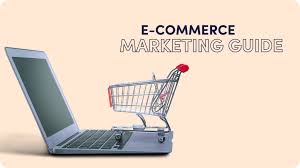The Power of Ecommerce Website Marketing
In today’s digital age, having a strong online presence is crucial for the success of any ecommerce business. With the rise of ecommerce platforms, the competition is fierce, making it essential for businesses to implement effective marketing strategies to stand out in the crowded online marketplace.
Understanding Ecommerce Website Marketing
Ecommerce website marketing involves promoting your online store through various digital channels to attract potential customers and drive sales. It encompasses a range of strategies, including search engine optimisation (SEO), pay-per-click (PPC) advertising, social media marketing, email marketing, content marketing, and more.
The Benefits of Effective Ecommerce Marketing
Implementing a robust ecommerce marketing strategy can offer numerous benefits to your business:
- Increased Visibility: Effective marketing efforts can help improve your website’s visibility in search engine results and drive organic traffic to your online store.
- Higher Conversion Rates: By targeting the right audience with relevant messaging, you can increase the likelihood of converting visitors into customers.
- Brand Awareness: Consistent marketing efforts can help build brand awareness and establish your ecommerce store as a trusted name in the industry.
- Customer Engagement: Engaging with customers through various marketing channels can foster relationships and encourage repeat business.
- Data-Driven Insights: Ecommerce marketing allows you to gather valuable data on customer behaviour and preferences, enabling you to make informed decisions to improve your strategies.
Tips for Successful Ecommerce Website Marketing
To maximise the impact of your ecommerce website marketing efforts, consider implementing the following tips:
- Optimise Your Website for SEO: Ensure that your website is optimised for search engines to improve its visibility and attract organic traffic.
- Create Compelling Content: Develop high-quality content that resonates with your target audience and encourages them to engage with your brand.
- Leverage Social Media Platforms: Utilise social media channels to connect with your audience, promote your products/services, and drive traffic to your website.
- Implement Email Marketing Campaigns: Create personalised email campaigns to nurture leads, promote special offers, and encourage repeat purchases.
- Analyse Performance Metrics: Monitor key performance indicators (KPIs) such as conversion rates, click-through rates, and ROI to assess the effectiveness of your marketing campaigns and make data-driven decisions.
In conclusion, effective ecommerce website marketing is essential for driving growth and success in today’s competitive digital landscape. By implementing strategic marketing initiatives tailored to your target audience, you can enhance brand visibility, engage customers effectively, and ultimately boost sales for your ecommerce business.
Essential FAQs on E-commerce Website Marketing: Strategies and Insights
- What is web-based marketing in e-commerce?
- How do I market my e-commerce website?
- What is ecommerce website marketing?
- What is the best marketing for ecommerce?
- What is e-commerce in marketing?
What is web-based marketing in e-commerce?
Web-based marketing in e-commerce refers to the use of digital channels and online platforms to promote and sell products or services through an electronic medium. It encompasses a range of strategies such as search engine optimisation (SEO), pay-per-click (PPC) advertising, social media marketing, email marketing, content marketing, and more. By leveraging the power of the internet, e-commerce businesses can reach a wider audience, drive traffic to their websites, increase brand visibility, engage with customers effectively, and ultimately boost sales. Web-based marketing plays a pivotal role in enhancing the online presence of e-commerce stores and maximising their potential for success in the competitive digital marketplace.
How do I market my e-commerce website?
Marketing an e-commerce website involves implementing a comprehensive strategy to drive traffic, engage customers, and ultimately boost sales. To market your e-commerce website effectively, consider utilising a mix of digital marketing tactics such as search engine optimisation (SEO) to improve your website’s visibility in search results, pay-per-click (PPC) advertising to target specific audiences, social media marketing to connect with customers and promote products/services, email marketing to nurture leads and encourage repeat purchases, and content marketing to provide valuable information and engage visitors. By combining these strategies and tailoring them to your target audience, you can effectively market your e-commerce website and achieve business growth in the competitive online marketplace.
What is ecommerce website marketing?
Ecommerce website marketing refers to the strategic promotion and advertising efforts aimed at driving traffic, increasing brand visibility, and ultimately boosting sales for online stores. This multifaceted approach involves leveraging various digital marketing channels such as SEO, PPC advertising, social media marketing, email campaigns, and content creation to attract potential customers and engage with existing ones. By implementing targeted marketing strategies tailored to the unique needs of an ecommerce business, companies can enhance their online presence, build brand recognition, and create opportunities for growth in the competitive digital marketplace.
What is the best marketing for ecommerce?
When it comes to determining the best marketing strategy for ecommerce, there is no one-size-fits-all answer. The effectiveness of a marketing approach largely depends on the specific goals, target audience, budget, and industry of the ecommerce business. However, a combination of various digital marketing tactics such as search engine optimisation (SEO), pay-per-click (PPC) advertising, social media marketing, email campaigns, content marketing, and influencer partnerships can often yield successful results. It is essential for ecommerce businesses to analyse their unique requirements and conduct thorough research to identify the most suitable marketing mix that aligns with their objectives and drives maximum return on investment.
What is e-commerce in marketing?
E-commerce in marketing refers to the strategic use of electronic platforms and digital technologies to promote, sell, and distribute products or services online. It encompasses a wide range of activities, including setting up online stores, implementing digital marketing campaigns, leveraging social media channels, and utilising data analytics to target and engage with customers effectively. E-commerce marketing aims to enhance brand visibility, drive website traffic, increase conversions, and ultimately boost sales in the competitive online marketplace. By harnessing the power of e-commerce tools and techniques, businesses can reach a global audience, build customer relationships, and achieve sustainable growth in the digital age.

